Definition of Health from a Medical Perspective
When we talk about health, the traditional definition typically revolves around physical wellness. This is the idea that good health is achieved through maintaining a healthy lifestyle, eating nutritious foods, exercising regularly, and getting enough rest. However, this definition of health is only one part of a much larger picture.
Medical professionals have long been at the forefront of defining health. They focus on diagnosing illnesses, prescribing treatments, and helping patients maintain their overall health. From a medical perspective, health is defined as “a state of complete physical, mental, and social well-being, not merely the absence of disease or infirmity.”
Exploring Different Definitions of Health
While physical health is an important factor in overall wellbeing, other aspects such as mental and emotional health are just as crucial. Lifestyle choices such as diet, exercise, and sleep habits can have a major impact on our overall health. Other factors such as stress levels, relationships, and work environment also play a role in our overall health.
Additionally, social determinants of health such as access to education, employment opportunities, and housing can also influence our health. These factors can shape our environment, and ultimately, our ability to make informed decisions about our health.

How Social Factors Impact Our Perception of Health
Our perception of health is also shaped by our culture and beliefs. Many cultures place an emphasis on different aspects of health, such as physical, spiritual, or mental wellness. The media can also have an influence on our understanding of health, often depicting unrealistic standards of beauty or idealized lifestyles.
What is Mental Health and Why Does it Matter?
Mental health is an often overlooked aspect of health, but it plays an essential role in our overall wellbeing. Mental health refers to our psychological, emotional, and social wellbeing. It involves our ability to manage our thoughts, feelings, and behaviors in order to cope with life’s challenges.
Mental health issues can range from mild depression or anxiety to more serious conditions such as schizophrenia or bipolar disorder. It is important to recognize the signs of mental illness and seek help when needed. Mental health services such as counseling, therapy, and medication can help individuals manage their mental health.
A Comprehensive Look at Physical, Mental and Emotional Health
Physical, mental, and emotional health are all interconnected. In order to achieve overall wellbeing, it is important to maintain balance in all three areas. This means taking care of your body through healthy eating, exercise, and adequate sleep, as well as managing stress levels and engaging in activities that bring joy and meaning to your life.
It is also important to practice self-care and build strong relationships with others. Connecting with family, friends, and community members can help promote resilience and increase feelings of connectedness.

The Importance of Preventative Health Practices
Preventative health practices are an important part of maintaining overall wellbeing. These practices involve taking steps to reduce the risks of developing certain diseases or illnesses. Examples of preventative health practices include eating a balanced diet, getting regular physical activity, avoiding smoking, limiting alcohol consumption, and getting regular checkups.
These practices can help to improve overall health and quality of life. Additionally, they can help to reduce the need for medical intervention and can lead to cost savings in the long run.

How Technology is Transforming Health Care
Technology is having a major impact on health care. Advances in technology have enabled medical professionals to diagnose illnesses more quickly and accurately, and to develop more effective treatments. Technology has also made it easier for patients to access health information, track their health data, and connect with medical professionals remotely.
In the future, technology is likely to continue to transform health care. For example, artificial intelligence could be used to diagnose illnesses more efficiently, while virtual reality could be used to treat mental health issues such as anxiety and depression. As technology advances, it will become increasingly important to ensure that it is used ethically and responsibly to ensure the best outcomes for patients.
Health is an ever-evolving concept, and it is important to understand the various factors that contribute to it. From a medical perspective, health is defined as “a state of complete physical, mental, and social well-being, not merely the absence of disease or infirmity.” To achieve overall health, it is important to maintain balance in all areas of life, including physical, mental, and emotional health. Additionally, preventative health practices and technological advancements can help to improve health outcomes.
(Note: Is this article not meeting your expectations? Do you have knowledge or insights to share? Unlock new opportunities and expand your reach by joining our authors team. Click Registration to join us and share your expertise with our readers.)
